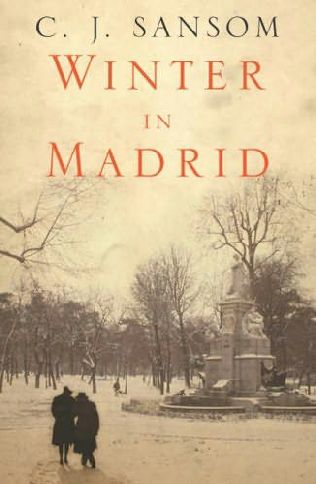
Winter in Madrid
, by CJ SansomWhat do you do if a student of yours - whom you respect and whose company you enjoy, mind - gives you a present? Why, you express your gratitude and make use of it, of course. Now, here's the conundrum: what if that present is a book you've never heard of, and which upon reading the first chapter you know you will dislike? I'll tell you what I did. I soldiered on out of respect for the fact that someone cared enough to think of me and part with his money to show it.
After reading this book, I now know I have a
lot of respect.
Where do I begin? The clichéd use of an historical setting for a love story? The predictable plot? The charicatured portrayal of English and Spanish alike? The unnecessary descriptive language? Or the fact that it was just
boring?
Europe. 1940. Dunkirk veteran Harry Brett is called on by His Majesty's Government to spy on his old schoolmate Sandy Forsyth, who appears to be profiting from the Fascist regime in Franco's newly-established Spain. Britain wants to keep Spain out of the war, and if they can find anything which they can use against the Spanish Government they will. Meanwhile, Sandy's commonlaw wife Barbara Clare is looking for her missing-believed-dead ex-boyfriend who was an International Brigadier fighting for the Republic, and who is being held illegally in a concentration camp on the outskirts of the city. Love, war and politics merge in this unexciting wannabe epic which smacks of mundanity.
The main sensation, while struggling through the dull prose, was that of having seen, heard and read it all before, and by far more capable writers. The plot works to a love-story-in-times-of-war-by-numbers format, and Sansom seems to delight in describing every last detail of war-torn and impoverished Madrid to remind us that 1) this is history; 2) this is grim; and 3) Franco was bad. Apart from such simplistic setting, the reader finds himself not caring one iota for any of the characters: are we really expected to believe that Bernie, Barbara's republican lover, fell in love withher after a week? Then Sansom has the tumerity to repeat the rapidity of feeling between Harry and Sofia, his Spanish girlfriend.
Don't even get me started on the nationalistic representations. I can only hope I missed the surely ironic references to stiff-upper-lipped english diplomats and military types, haughtily efficient Germans, and sadistic Spanish concentration camp officers, or fierce and fiery Spanish women. It's like the literary equivalent of watching a poorly-made propaganda film. Sansom also enjoys reminding his readers that the characters are spanish by littering their speech with familiar phrases in the language. My personal favourite was his liberal use of the term "Madre de Dios", prefixed before most sentences, regardless of which particular Spaniard was supposedly speaking. The only really interesting character was the main antagonist, amoral and greedy Sandy Forsyth, who manipulates everyone around him by playing on their insecurities and using them to advance his own financial status.
Nevertheless, I was entertained by the book, not least because I recognised so many clichés. It almost got to the stage in which I was enjoying how badly it was written. Almost. The "shock" ending is somewhat satisfying, denying the reader the entirely happy ending he so richly deserves; but even this is a familiar technique of historical novels, and it is at this point the novel finally falls into the trap of thinking more of itself than it really is. So, everyone is left unhappy (or dead, in one particular sequence which can only be described as disturbingly Tarantino-esque) but Sandy, who worms his way back into the UK under the guise of an argentine businessman? Yeah, right...
The quote on the cover (from
The Daily Express, no less) boasts that "[i]f you like Sebastian Faulks and Carlos Ruiz Zafón, you'll love this". I can't work out who should be most insulted: the authors cited for having their names associated with this drivel; the reader for being so fooled; or Sansom himself for having his ego stroked in such a manner one wonders if this is some sort of joke he has failed to get. Unless you have to, don't read this book.
No Stars.

.webp)







No comments:
Post a Comment